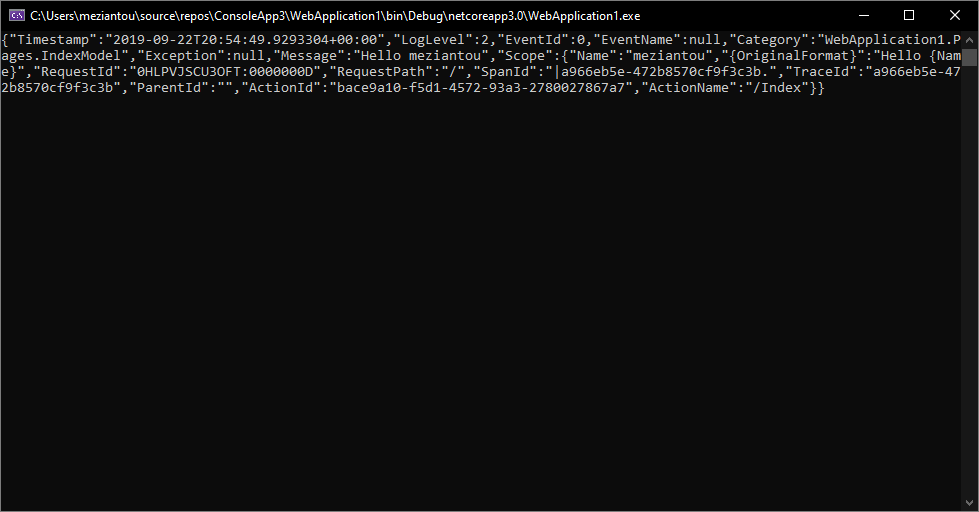ASP.NET Core supports a logging API that works with a variety of built-in and third-party logging providers. The built-in providers allow logging to the console, the debug output, or as ETW messages. In my case, I needed to output the messages and their associated data to the console as JSON. This means I had to create a custom logger and integrate it into the ASP.NET Core application.
Let's define the structure of a message:
C#
internal sealed class JsonLogEntry
{
public DateTimeOffset Timestamp { get; set; }
public int LogLevel { get; set; }
public int EventId { get; set; }
public string EventName { get; set; }
public string Category { get; set; }
public string Exception { get; set; }
public string Message { get; set; }
public IDictionary<string, object> Scope { get; } = new Dictionary<string, object>(StringComparer.Ordinal);
}
Then, the logger can be implemented. The idea is to create a JsonLogEntry with the data of the message and then convert it to json.
C#
public sealed class JsonLogger : ILogger
{
private readonly TextWriter _writer;
private readonly string _categoryName;
internal IExternalScopeProvider ScopeProvider { get; set; }
public JsonLogger(TextWriter writer, string categoryName, IExternalScopeProvider scopeProvider)
{
_writer = writer;
_categoryName = categoryName;
ScopeProvider = scopeProvider;
}
public IDisposable BeginScope<TState>(TState state) => ScopeProvider?.Push(state) ?? NullScope.Instance;
public bool IsEnabled(LogLevel logLevel) => logLevel != LogLevel.None;
public void Log<TState>(LogLevel logLevel, EventId eventId, TState state, Exception exception, Func<TState, Exception, string> formatter)
{
if (formatter is null)
throw new ArgumentNullException(nameof(formatter));
var message = new JsonLogEntry
{
Timestamp = DateTime.UtcNow,
LogLevel = (int)logLevel,
EventId = eventId.Id,
EventName = eventId.Name,
Category = _categoryName,
Exception = exception?.ToString(),
Message = formatter(state, exception),
};
// Append the data of all BeginScope and LogXXX parameters to the message dictionary
AppendScope(message.Scope, state);
AppendScope(message.Scope);
_writer.WriteLine(JsonConvert.SerializeObject(message, Formatting.None));
}
private void AppendScope(IDictionary<string, object> dictionary)
{
ScopeProvider.ForEachScope((scope, state) => AppendScope(state, scope), dictionary);
}
private static void AppendScope(IDictionary<string, object> dictionary, object scope)
{
if (scope == null)
return;
// The scope can be defined using BeginScope or LogXXX methods.
// - logger.BeginScope(new { Author = "meziantou" })
// - logger.LogInformation("Hello {Author}", "meziaantou")
// Using LogXXX, an object of type FormattedLogValues is created. This type is internal but it implements IReadOnlyList, so we can use it.
// https://github.com/aspnet/Extensions/blob/cc9a033c6a8a4470984a4cc8395e42b887c07c2e/src/Logging/Logging.Abstractions/src/FormattedLogValues.cs
if (scope is IReadOnlyList<KeyValuePair<string, object>> formattedLogValues)
{
if (formattedLogValues.Count > 0)
{
foreach (var value in formattedLogValues)
{
// MethodInfo is set by ASP.NET Core when reaching a controller. This type cannot be serialized using JSON.NET, but I don't need it.
if (value.Value is MethodInfo)
continue;
dictionary[value.Key] = value.Value;
}
}
}
else
{
// The idea is to get the value of all properties of the object and add them to the dictionary.
// dictionary["Prop1"] = scope.Prop1;
// dictionary["Prop2"] = scope.Prop2;
// ...
// We always log the same objects, so we can create a cache of compiled expressions to fill the dictionary.
// Using reflection each time would slow down the logger.
var appendToDictionaryMethod = ExpressionCache.GetOrCreateAppendToDictionaryMethod(scope.GetType());
appendToDictionaryMethod(dictionary, scope);
}
}
// In ASP.NET Core 3.0 this classes is now internal. This means you need to add it to your code.
private sealed class NullScope : IDisposable
{
public static NullScope Instance { get; } = new NullScope();
private NullScope() { }
public void Dispose() { }
}
// Create and cache compiled expression to fill the dictionary from an object
private static class ExpressionCache
{
public delegate void AppendToDictionary(IDictionary<string, object> dictionary, object o);
private static readonly ConcurrentDictionary<Type, AppendToDictionary> s_typeCache = new ConcurrentDictionary<Type, AppendToDictionary>();
private static readonly PropertyInfo _dictionaryIndexerProperty = GetDictionaryIndexer();
public static AppendToDictionary GetOrCreateAppendToDictionaryMethod(Type type)
{
return s_typeCache.GetOrAdd(type, t => CreateAppendToDictionaryMethod(t));
}
private static AppendToDictionary CreateAppendToDictionaryMethod(Type type)
{
var dictionaryParameter = Expression.Parameter(typeof(IDictionary<string, object>), "dictionary");
var objectParameter = Expression.Parameter(typeof(object), "o");
var castedParameter = Expression.Convert(objectParameter, type); // cast o to the actual type
// Create setter for each properties
// dictionary["PropertyName"] = o.PropertyName;
var properties = type.GetProperties(BindingFlags.Instance | BindingFlags.Public | BindingFlags.FlattenHierarchy);
var setters =
from prop in properties
where prop.CanRead
let indexerExpression = Expression.Property(dictionaryParameter, _dictionaryIndexerProperty, Expression.Constant(prop.Name))
let getExpression = Expression.Property(castedParameter, prop.GetMethod)
select Expression.Assign(indexerExpression, getExpression);
var body = new List<Expression>(properties.Count + 1);
body.Add(castedParameter);
body.AddRange(setters);
var lambdaExpression = Expression.Lambda<AppendToDictionary>(Expression.Block(body), dictionaryParameter, objectParameter);
return lambdaExpression.Compile();
}
// Get the PropertyInfo for IDictionary<string, object>.this[string key]
private static PropertyInfo GetDictionaryIndexer()
{
var indexers = from prop in typeof(IDictionary<string, object>).GetProperties(BindingFlags.Instance | BindingFlags.Public)
let indexParameters = prop.GetIndexParameters()
where indexParameters.Length == 1 && typeof(string).IsAssignableFrom(indexParameters[0].ParameterType)
select prop;
return indexers.Single();
}
}
}
To integrate the logger in ASP.NET, you need to implement the ILoggerProvider interface. This interface contains only one method: CreateLogger(string categoryName). This method returns an instance of ILogger. To not instantiate too much objects, you can use a dictionary to store existing instances and reuse them when needed.
C#
public sealed class JsonLoggerProvider : ILoggerProvider
{
private readonly LoggerExternalScopeProvider _scopeProvider = new LoggerExternalScopeProvider();
private readonly ConcurrentDictionary<string, JsonLogger> _loggers = new ConcurrentDictionary<string, JsonLogger>(StringComparer.Ordinal);
public ILogger CreateLogger(string categoryName)
{
return _loggers.GetOrAdd(categoryName, category => new JsonLogger(Console.Out, category, _scopeProvider));
}
public void Dispose()
{
}
}
Finally, you can integrate the logger in the ASP.NET Core. Open the Program.cs file and edit the main method to replace existing loggers with the JSON logger.
C#
// In ASP.NET Core 2
public static IWebHostBuilder CreateWebHostBuilder(string[] args) =>
WebHost.CreateDefaultBuilder(args)
.ConfigureLogging((host, builder) =>
{
// Register json logger in non-development environments only.
if (!host.HostingEnvironment.IsDevelopment())
{
// Remove default loggers
foreach (var s in builder.Services.Where(service => service.ServiceType == typeof(ILoggerProvider)).ToList())
{
builder.Services.Remove(s);
}
builder.Services.AddSingleton<ILoggerProvider, JsonLoggerProvider>();
}
})
.UseStartup<Startup>();
// In .NET Core 3.0
public static IHostBuilder CreateHostBuilder(string[] args) =>
Host.CreateDefaultBuilder(args)
.ConfigureLogging((host, builder) =>
{
// Register json logger in non-development environments only.
if (!host.HostingEnvironment.IsDevelopment())
{
// Remove default loggers
foreach (var s in builder.Services.Where(service => service.ServiceType == typeof(ILoggerProvider)).ToList())
{
builder.Services.Remove(s);
}
builder.Services.AddSingleton<ILoggerProvider, JsonLoggerProvider>();
}
})
.ConfigureWebHostDefaults(webBuilder =>
{
webBuilder.UseStartup<Startup>();
webBuilder.UseKestrel(options => options.AddServerHeader = false);
});
That's it. The application now outputs logs as JSON in the console.

Do you have a question or a suggestion about this post? Contact me!